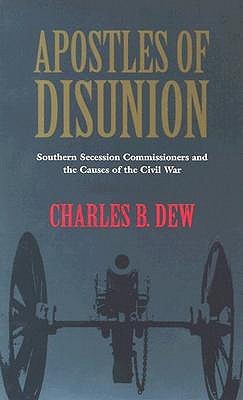Apostles of Disunion Book Summary
Southern Secession Commissioners and the Causes of the Civil War
TL;DR
"Apostles of Disunion" by Charles B. Dew investigates the role of Southern secession commissioners in the lead-up to the Civil War, revealing that slavery and racial fears were the central motives behind the South's decision to secede from the Union.
What is Apostles of Disunion about
In "Apostles of Disunion: Southern Secession Commissioners and the Causes of the Civil War," Charles B. Dew explores the pivotal role played by state-appointed commissioners in persuading Southern states to secede from the Union in 1860-1861. These commissioners were tasked with articulating the rationale for secession, presenting a vehement message to both politicians and citizens. Dew argues against the neo-Confederate narrative that downplays slavery's role in the secessionist movement. Through meticulous examination of the commissioners' speeches and letters, he uncovers a blatant white supremacist ideology that underscores their advocacy for disunion. Their rhetoric consistently points to the election of Abraham Lincoln as a definitive threat to slavery, framing emancipation as a catalyst for racial chaos in the South.
Apostles of Disunion 8 Key Takeaways
Secession was fundamentally about slavery.
Dew posits that the commissioners' speeches explicitly reflect a fear of losing the institution of slavery, countering the arguments that it was merely about states' rights.
Racial ideology was central to the secessionist cause.
The commissioners conveyed a white supremacist ideology, implying that the preservation of slavery was essential to maintaining racial hierarchies.
The commissioners acted as propagandists for secession.
Their role was to articulate the perceived threats and justify the need for secession to the people of the South.
Political grievances were secondary to the issue of slavery.
While the commissioners cited Northern political actions as outrages, they ultimately framed their arguments around the imminent danger to slavery.
Dew's work challenges contemporary historical narratives.
By examining primary sources, Dew challenges the notion that slavery was not a critical factor in the Civil War's onset.
The book contributes to ongoing debates about the Civil War's causes.
Dew's research provides a nuanced understanding of the motivations behind Southern secession, reshaping historical perspectives.
Public letters and speeches provide insight into secession motives.
Dew emphasizes the importance of the commissioners' rhetoric in understanding the ideological underpinnings of secession.
Historical context is crucial for understanding motivations.
Dew situates the commissioners' arguments within the broader context of antebellum Southern society and its values.
Top Apostles of Disunion Quotes
- "The election of Lincoln marked the North's commitment to destroy slavery, an act that would plunge the South into a racial nightmare."
- "The rhetoric of secession was steeped in a white supremacist ideology that justified the need for disunion."
- "To understand the Civil War, we must confront the reality that slavery was at its very core."
Who should read Apostles of Disunion?
This book is ideal for historians, students of American history, and anyone interested in the Civil War era. Readers will gain a profound understanding of the complex motivations behind secession, particularly the role of slavery and race, which continue to resonate in contemporary discussions about race and politics.
Apostles of Disunion Best Reviews
- "Dew provides a compelling and meticulously researched narrative that reexamines the motivations behind Southern secession, shedding light on the often-ignored role of slavery and racism." - Historical Journal
- "A provocative and insightful analysis that challenges long-held beliefs about the Civil War's causes. Dew's work is essential for anyone wanting a deeper understanding of this pivotal period in American history." - Civil War History
People also liked these summaries
Apostles of Disunion FAQs
What is the main argument of "Apostles of Disunion"?
The main argument is that slavery and racial fears were central to the motivations for Southern secession, countering narratives that minimize these factors.
Who were the secession commissioners?
Secession commissioners were representatives appointed by Southern states to advocate for secession and persuade other states to join the cause.
Why is this book significant for understanding the Civil War?
This book provides a nuanced perspective on the causes of the Civil War, emphasizing the importance of slavery and race in shaping the conflict.
